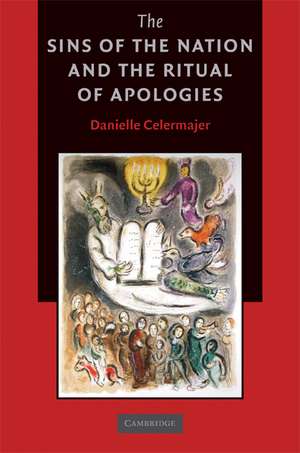The Sins of the Nation and the Ritual of Apologies
Autor Danielle Celermajeren Limba Engleză Hardback – 26 apr 2009
Preț: 721.85 lei
Preț vechi: 839.37 lei
-14% Nou
Puncte Express: 1083
Preț estimativ în valută:
138.14€ • 143.69$ • 114.05£
138.14€ • 143.69$ • 114.05£
Carte tipărită la comandă
Livrare economică 15-29 aprilie
Preluare comenzi: 021 569.72.76
Specificații
ISBN-13: 9780521516693
ISBN-10: 0521516692
Pagini: 294
Dimensiuni: 164 x 240 x 24 mm
Greutate: 0.59 kg
Editura: Cambridge University Press
Colecția Cambridge University Press
Locul publicării:New York, United States
ISBN-10: 0521516692
Pagini: 294
Dimensiuni: 164 x 240 x 24 mm
Greutate: 0.59 kg
Editura: Cambridge University Press
Colecția Cambridge University Press
Locul publicării:New York, United States
Cuprins
Introduction: the apology and political theory; 1. The apology phenomenon; 2. Apologies as speech acts; 3. Judaism's apology: reconstituting the community; 4. The privatization of repentance in Christianity; 5. Australia's divided history; 6. Saying sorry in Australia; 7. Apology's responsibility; 8. Apology as political action; Bibliography.
Recenzii
'An extraordinary inquiry into what political apologies are, why today they are valued and valuable, and how they may be reconciled with liberal democratic norms. Drawing on an impressive range of historical and contemporary sources, Sins of the Nation shows how contemporary politics and political theory can benefit from the wisdom of some of our major religious traditions. It is destined to be a landmark work on the subject.' Geoffrey Levey, University of New South Wales
'In this rich and deeply engaging book Celermajer directly and convincingly takes on the criticisms levied at 'political apologies.' Celermajer argues against those who have dismissed apologies as 'empty' political talk, as 'category mistakes,' where apologies are only meaningful when given or received by individuals, not collectives, or as inappropriate intrusions of religion into political life. Through close examination of the Australian experience, Celermajer shows that religious ideas and rituals provide especially useful ways of thinking about collective responsibility and guilt. Apologies assist in're-covenanting' the political community. On her view, political apologies blur the line between secularism and religion, individual and community, precisely because this is what political life requires today.' Melissa Nobles, Massachusetts Institute of Technology and author of The Politics of Official Apologies (Cambridge
'For liberals, Danielle Celermajer argues in this lucid and important book, collective apology seems like a category mistake: only individuals can apologize; anything else smacks of collective judgment, which goes against the grain of the modern sense of justice … At the same time, for followers of Nietzsche, rituals of repentance are the revenge of history's losers, a central means by which the past holds the present in its tyrannical grip. In contrast to this limited framework, The Sins of the Nation and the Ritual of Apologies argues compellingly that we live in a world substantially more shaped by narratives of sin and redemption than contemporary political theory can handle well. This is a richly informative, impressively argued work that is sure to have a significant impact on our thinking about collective responsibility for history and the demands of political justice. It is a must read.' Jeffrey Olick, University of Virginia
'Provocative, erudite and insightful, this book is a model of interdisciplinary scholarship. Challenging received wisdom, the author deepens our understanding and invites us to rethink apology's place in transitional justice. It is a work that considers afresh foundational questions about the relation between religion and politics. Must reading for anyone concerned today with reconciliation and forgiveness.' Ruti Teitel, New York Law School, and author of Transitional Justice
'Since approximately the mid-1980s there has been a large increase in the number of apologies in the public sphere and Celermajer's book is a major addition in trying to explain how the concept of the apology makes sense in this sphere and how it reveals the limitations of liberal concepts of justice.' Michael Cunningham, Journal of Modern Jewish Studies
'In this rich and deeply engaging book Celermajer directly and convincingly takes on the criticisms levied at 'political apologies.' Celermajer argues against those who have dismissed apologies as 'empty' political talk, as 'category mistakes,' where apologies are only meaningful when given or received by individuals, not collectives, or as inappropriate intrusions of religion into political life. Through close examination of the Australian experience, Celermajer shows that religious ideas and rituals provide especially useful ways of thinking about collective responsibility and guilt. Apologies assist in're-covenanting' the political community. On her view, political apologies blur the line between secularism and religion, individual and community, precisely because this is what political life requires today.' Melissa Nobles, Massachusetts Institute of Technology and author of The Politics of Official Apologies (Cambridge
'For liberals, Danielle Celermajer argues in this lucid and important book, collective apology seems like a category mistake: only individuals can apologize; anything else smacks of collective judgment, which goes against the grain of the modern sense of justice … At the same time, for followers of Nietzsche, rituals of repentance are the revenge of history's losers, a central means by which the past holds the present in its tyrannical grip. In contrast to this limited framework, The Sins of the Nation and the Ritual of Apologies argues compellingly that we live in a world substantially more shaped by narratives of sin and redemption than contemporary political theory can handle well. This is a richly informative, impressively argued work that is sure to have a significant impact on our thinking about collective responsibility for history and the demands of political justice. It is a must read.' Jeffrey Olick, University of Virginia
'Provocative, erudite and insightful, this book is a model of interdisciplinary scholarship. Challenging received wisdom, the author deepens our understanding and invites us to rethink apology's place in transitional justice. It is a work that considers afresh foundational questions about the relation between religion and politics. Must reading for anyone concerned today with reconciliation and forgiveness.' Ruti Teitel, New York Law School, and author of Transitional Justice
'Since approximately the mid-1980s there has been a large increase in the number of apologies in the public sphere and Celermajer's book is a major addition in trying to explain how the concept of the apology makes sense in this sphere and how it reveals the limitations of liberal concepts of justice.' Michael Cunningham, Journal of Modern Jewish Studies
Notă biografică
Descriere
This book examines the apology's extraordinary political emergence and significance to ideas of collective responsibility, ritual, and contemporary politics.















